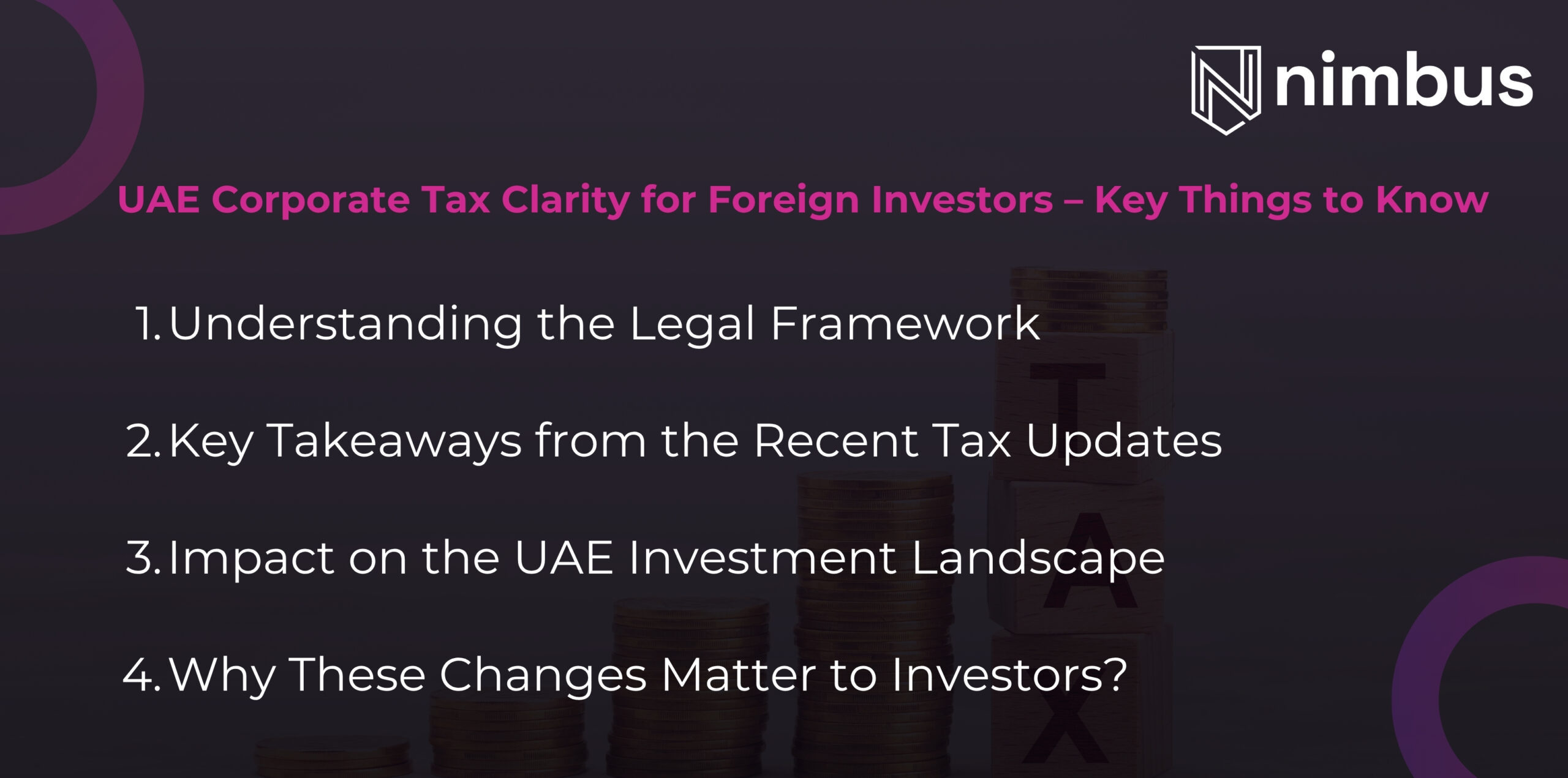In a move welcomed by the global investment community, the UAE has provided much-needed clarity on the corporate tax treatment of foreign investors in Qualifying Investment Funds (QIFs) and Real Estate Investment Trusts (REITs).
With the issuance of several key Cabinet Decisions, non-resident investors now have a clear roadmap to determine their tax obligations in the UAE, reducing the risk of unintended tax exposure and compliance burdens.
This blog entails the latest developments in UAE corporate tax law affecting foreign institutional investors, particularly in the context of fund structures and highlights the practical implications for investment planning and business setup in the UAE.
UAE Corporate Tax Clarity for Foreign Investors – Key Things to Know
– Understanding the Legal Framework
The UAE introduced corporate tax through Federal Decree-Law No. 47 of 2022, commonly referred to as the Corporate Tax Law. Under Article 11 of the law, a non-resident person can be considered a taxable person in the UAE if they have a “nexus” in the state.
This nexus is further defined by Cabinet Decision No. 56 of 2023, which clarifies that a non-resident has a nexus if they derive income from immovable property in the UAE. Cabinet Decision No. 81 of 2023 followed, providing more detail on what constitutes taxable income for non-resident investors.
Most recently, Cabinet Decisions No. 34 and 35 of 2025 have addressed the treatment of income from QIFs and REITs, offering clear guidelines to reduce tax uncertainty for non-resident juridical persons.
– Key Takeaways from the Recent Tax Updates
- No Taxable Presence Without Nexus
Non-resident investors in UAE-based QIFs and REITs will generally not be treated as having a taxable presence in the UAE, unless specific conditions are triggered. Income such as dividends and capital gains from compliant funds is not subject to UAE Corporate Tax for these investors, provided the fund meets certain criteria. - Qualifying Conditions for Funds
To avoid creating a taxable nexus for non-resident investors, the fund must comply with the following:- For QIFs, real estate assets must not exceed 10% of total assets.
- Ownership must be diversified and not concentrated among a small group of investors.
- At least 80% of the fund’s income must be distributed to investors within nine months from the end of the financial year.
- Events That Trigger a Taxable Nexus
A taxable nexus may arise for a non-resident investor under specific circumstances:- On the date of dividend distribution if the fund meets the 80% income distribution threshold.
- On the date of ownership acquisition if the fund fails to meet the distribution requirement.
- For QIFs, a nexus may also be created if the fund does not maintain the required diversity of ownership during the tax year.
- Safeguards for Breaches of Conditions
The legislation provides relief mechanisms in the event of a breach of these conditions. These include:- If a QIF’s real estate holdings exceed 10%, only 80% of the income from those holdings will be taxable; 20% remains tax-exempt.
- If the ownership diversity condition is breached, the fund has a 90-day grace period to rectify the issue.
- Importantly, the tax consequences of a breach are limited to the investor or investors responsible for it. The rest of the fund and its compliant investors retain their QIF or REIT status and associated tax benefits.
These safeguards ensure that a single investor’s failure does not penalize the entire investor group and prevent complete disqualification of the fund.
– Impact on the UAE Investment Landscape
As of mid-2024, the Securities and Commodities Authority (SCA) reported strong growth in UAE’s fund ecosystem. The number of licensed portfolio and fund management firms rose by 83%, with 33 active companies compared to 18 in January 2023.
Additionally, 25 new applications for investment funds were submitted, bringing the total number of local investment funds expected to reach 58.
The REIT sector is also gaining traction, with several active vehicles like Emirates REIT and ENBD REIT contributing to the maturing real estate investment landscape.
The availability of tax clarity will support the ongoing development of this sector by making the UAE more attractive to overseas institutional investors.
– Why These Changes Matter to Investors?
- Reduced Tax Uncertainty
Clear guidance reduces the risk of foreign investors unintentionally creating a taxable nexus in the UAE, especially those passively investing in REITs or QIFs. - Reduced Tax Uncertainty
Clear guidance reduces the risk of foreign investors unintentionally creating a taxable nexus in the UAE, especially those passively investing in REITs or QIFs. - Improved Compliance Planning
Investors now understand the specific actions like distribution timing and ownership structure that might trigger tax consequences. This allows for better planning and documentation, especially for those planning to invest in company formation in the UAE. - Support for UAE’s Position as a Global Investment Hub
These updates enhance the UAE’s reputation as a low-friction jurisdiction for fund-based investing, aligned with international tax standards while remaining investor-friendly.
– Looking Ahead
For foreign institutional investors, the UAE’s updated corporate tax framework offers both clarity and confidence. By outlining exactly when a nexus is created and what compliance looks like, the country has removed much of the ambiguity that often clouds cross-border investments.
Fund managers are now better equipped to meet the QIF and REIT qualifications, ensuring their investors are protected from unintended tax liabilities.
As the UAE continues to refine its corporate tax regime, investors and fund managers alike should stay updated on regulatory developments and consider working closely with local tax advisors and consultants to ensure ongoing compliance. All these reforms make the UAE an even more compelling place for business setup services.




